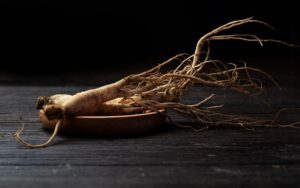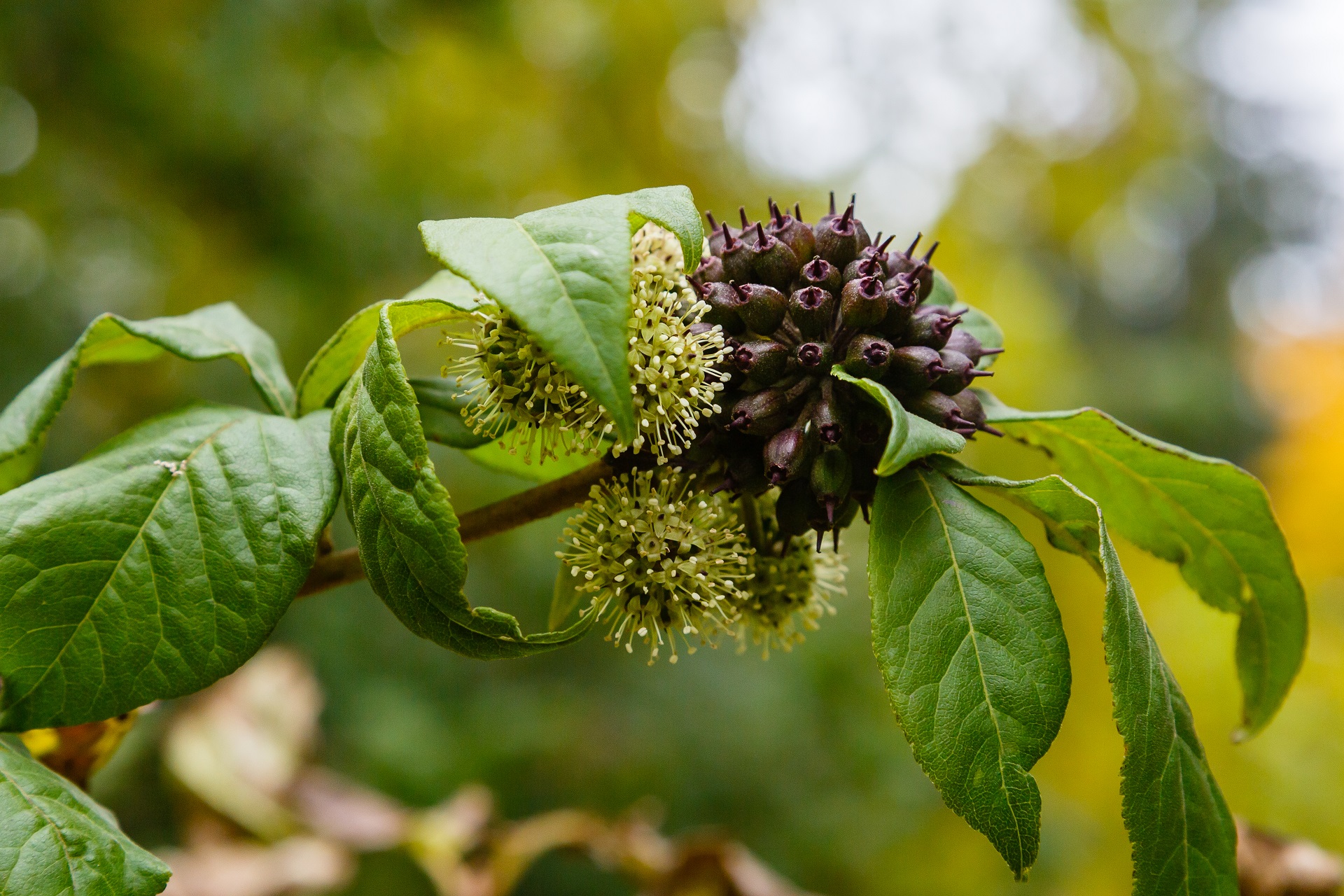Siberian ginseng (Eleutherococcus senticosus) – definition
Siberian ginseng is a shrub that grows in East Asia, Japan, China, Korea and Siberia. It is an adaptogen that has been used by traditional Chinese medicine for more than 4000 years. Eleutherococcus senticosus contains saponins, lignans, coumarins, flavonoids, phenolic acids and essential oils. The main biologically active metabolites are eleuterosides, including eleuteroside B (syringin) and eleuteroside E, which are found in the underground and aboveground parts of the plant. In addition, the fruit is rich in polyphenols, flavonoids and minerals. These compounds have a strengthening effect on the body, adapting it to cope with stress and other stresses such as heat and cold. Various products are made from the plant, such as oral liquid, capsules, tea and wine.

Siberian ginseng (Eleutherococcus senticosus) – health properties
Siberian ginseng has antioxidant, anti-inflammatory, anti-cancer, anti-diabetic, cholagogic, hepatoprotective effects, as well as protecting the central nervous and circulatory systems and improving microcirculation. Eleuterosides exhibit protective functions against neuronal cell death via inhibitory effects on CYP2C9 and CYP2E1. The adaptogenic action of ginseng, on the other hand, is thought to be due to its effect on the hypothalamic-pituitary-adrenal axis. At the same time, it does not interfere with normal bodily functions, but only activates the body’s natural defence forces. In small doses, powdered ginseng fruit or infusion has a stimulating effect on the central nervous system, but in larger doses it can have sedative properties.
Eleutherococcus senticosus regulates the immune system and has antiviral and antibacterial effects. There are reports that it can reduce human morbidity and mortality during influenza epidemics and its typical complications such as pneumonia, bronchitis and otitis. One study on humans taking Siberian ginseng tincture for four weeks reported an increase in NK cells and cytotoxic and helper T cells.
Siberian ginseng extract has the potential to improve memory, as the active ingredients have the ability to penetrate and act in the brain, but this needs to be confirmed in human studies. Older people using Eleutherococcus senticosus for 4 weeks have been observed to safely improve some aspects of mental health and social functioning. A study of recreationally trained men found that supplementation for eight weeks with Siberian ginseng increased endurance, altered metabolism to conserve glycogen and improved cardiovascular function. Taking this plant improved VO2 and increased oxygen uptake.
Eleutherococcus senticosus extract can improve lipid and glycaemic profiles. In a study in which 31 participants received 75 drops of ginseng extract daily, a reduction in total cholesterol, LDL cholesterol fraction, triglycerides and glucose was noted compared to the group not taking the extract. It has been found that eleuteroside B may have cardioprotective properties, while eleuteroside E is able to modulate steroidogenesis and affect arachidonic acid, glutathione and tyrosine metabolism.
Siberian ginseng extract has been shown to have an anti-enzymatic effect against hyaluronidase or tyrosinase. Hyaluronidases are enzymes that break down hyaluronic acid and have been linked to increased inflammation and tumour growth.

Siberian ginseng (Eleutherococcus senticosus) – dosage and safety
The daily dose of Siberian ginseng is 2-3 g, with the equivalent dose in preparations. Indicated in states of stress, weakness, fatigue, for convalescence e.g. after operations and cancer, as an aid in the treatment of diabetes and the prevention of cardiovascular disease. Consumption of this extract is relatively safe and is not associated with any side effects. Contraindications to taking this plant include hypertension above 180/90 mm Hg, increased atherosclerosis, insomnia, hyperactivity and febrile conditions.
Bibliography:
Lamer-Zarawska E., Kowal-Gierczak B., Niedworok J.: Fitoterapia i leki roślinne. PZWL, Warszawa, 2007.
Graczyk F, Gębalski J, Makuch-Kocka A, Gawenda-Kempczyńska D, Ptaszyńska AA, Grzyb S, Bogucka-Kocka A, Załuski D. Phenolic Profile, Antioxidant, Anti-Enzymatic and Cytotoxic Activity of the Fruits and Roots of Eleutherococcus senticosus (Rupr. et Maxim.) Maxim. Molecules. 2022 Aug 30;27(17):5579.
Todorova V, Ivanov K, Ivanova S. Comparison between the Biological Active Compounds in Plants with Adaptogenic Properties (Rhaponticum carthamoides, Lepidium meyenii, Eleutherococcus senticosus and Panax ginseng). Plants (Basel). 2021 Dec 26;11(1):64.
Yamauchi Y, Ge YW, Yoshimatsu K, Komastu K, Kuboyama T, Yang X, Tohda C. Memory Enhancement by Oral Administration of Extract of Eleutherococcus senticosus Leaves and Active Compounds Transferred in the Brain. Nutrients. 2019 May 22;11(5):1142.
Jip Kuo, Kenny Wen-Chyuan Chen i wsp. The Effect of Eight Weeks of Supplementation with Eleutherococcus senticosus on Endurance Capacity and Metabolism in Human , Chinese Journal of Physiology 53(2): 105-111, 2010.
Todorova V, Ivanov K, Delattre C, Nalbantova V, Karcheva-Bahchevanska D, Ivanova S. Plant Adaptogens-History and Future Perspectives. Nutrients. 2021 Aug 20;13(8):2861.
A.F.G. Cicero , G. Derosa. Effects of siberian ginseng (Eleutherococcus senticosus) on elderly quality of life: a randomized clinical trial. Arch. Gerontol. Geriatr. Suppl. 9 (2004) 69–73
Li X, Chen C, Leng A, Qu J. Advances in the Extraction, Purification, Structural Characteristics and Biological Activities of Eleutherococcus senticosus Polysaccharides: A Promising Medicinal and Edible Resource With Development Value. Front Pharmacol. 2021 Nov 1;12:753007.
Bohn B, Nebe CT, Birr C. Flow-cytometric studies with eleutherococcus senticosus extract as an immunomodulatory agent. Arzneimittelforschung. 1987 Oct;37(10):1193-6.


